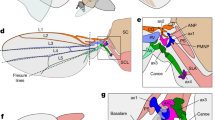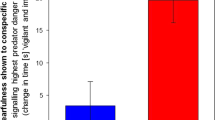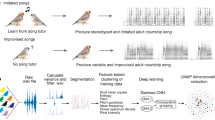Abstract
A PREVIOUS communication1 reported the effectiveness of flight exercise in abolishing the overruling response to light in overwintered adults of the ambrosia beetle Trypodendron (Xyloterus) lineatum Olivier. This observation is ecologically significant in explaining the behaviour of the insect in terms of one of its normal experiences. Evidently the photopositive response which initially compels it, advantageously, to dispersive flight indirectly sponsors termination of flight and unmasks a latent responsiveness to host factors, allowing it to settle down.
This is a preview of subscription content, access via your institution
Access options
Subscribe to this journal
Receive 51 print issues and online access
$199.00 per year
only $3.90 per issue
Buy this article
- Purchase on Springer Link
- Instant access to full article PDF
Prices may be subject to local taxes which are calculated during checkout
Similar content being viewed by others
References
Graham, K., Nature, 184, 283 (1959).
Chapman, J., Proc. Tenth Intern. Congr. Ent., 4, 375 (1956, 1958).
Wellington, W. G., Canad. Entomol., 80, 56 (1948).
Author information
Authors and Affiliations
Rights and permissions
About this article
Cite this article
GRAHAM, K. Air-Swallowing : a Mechanism in Photic Reversal of the Beetle Trypodendron . Nature 191, 519–520 (1961). https://doi.org/10.1038/191519a0
Published:
Issue Date:
DOI: https://doi.org/10.1038/191519a0
This article is cited by
-
Costs of delayed dispersal and alloparental care in the fungus-cultivating ambrosia beetle Xyleborus affinis Eichhoff (Scolytinae: Curculionidae)
Behavioral Ecology and Sociobiology (2011)
-
10.1007/BF00185586
CrossRef Listing of Deleted DOIs (2011)
-
Barometric flux
Journal of Chemical Ecology (1978)
-
Stereotyped pattern of locomotion controlled by duration of previous tracking by a predatory insect
Nature (1976)
-
Das Beziehungsgefüge zwischen Blattläusen und (landwirtschaftlichen) Kulturpflanzen als Beispiel eines Zyklus autökologischer Phasen
Der Züchter (1965)
Comments
By submitting a comment you agree to abide by our Terms and Community Guidelines. If you find something abusive or that does not comply with our terms or guidelines please flag it as inappropriate.



